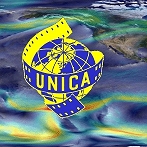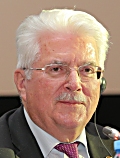
Letter from the President
December 2012
UNICA 2012 in Bulgaria

Dear Film Friends,
We congratulate our friends from the Bulgarian cinema enthusiasts,
led by their president Vladimir Iliev, who hosted
an admirable congress and festival at the end of August 2012. Apart
from minor problems due to a lack of translation equipment, we
enjoyed a perfectly-tuned UNICA in Ruse. Add to this the beautiful
weather which had us lingering on the terraces, the cool and
comfortable theatre, the first-class cultural discoveries such as
the Orthodox cathedral and the Metropolitan Bishop, the ancient site
of Nicopolis, the old capital of Veliko Tarnovo, not to mention the
conviviality we enjoyed during the ball, the open-air opening and
closing banquets with traditional music and dancing. All of the
above contributed to a relaxed atmosphere, creating an overall
feeling of well-being.
The only criticism I will express is that we did not have an
appropriate Jeunesse programme, either in its usual form
"UNICA-Jeunesse" nor in its European form "Youth in action" as it
was the case in Luxembourg. It is pointless to moan about missed
opportunities. Not to point the finger at anyone, but this item
should be repositioned in the checklist of pre-defined conditions
for local organisers to meet. Otherwise we should not be surprised
to see young people turn their backs on our organisation.
Apart from this negative observation, the film competition reached
very high standards. The films shown within the national programmes
were indeed of a fine quality. Who would have bet on Croatia
becoming the major winner of the competition by bringing home two
gold medals and the award for best national programme? But after the
surprise came boundless admiration. We must also congratulate the
jury under the leadership of Kees Tervoort, which
performed remarkably. There were very few criticisms of their work
and decisions.
General Assembly 2012
The General Assembly on Friday, August 31st, had the difficult
task of finding a successor to Jan Baca, who
decided to leave the committee after 40 years. Jan leaves an
indelible mark, thanks to his films and to his work within our
organisation. It is appropriate that the general assembly decided to
award him a UNICA
Honorary Membership. Art Hovanessian from Armenia
was elected by a narrow margin over Kees Tervoort
from the Netherlands. The other members of the committee have been
re-elected in their respective functions for three years.
Autumn Committee Meeting
The committee and its newest member met at the end of October in Heerlen (NL) for the autumn session. It was hosted by Jan Essing, Arie de Jong and their spouses Ineke and Ella.
Projection times
The committee had to cope with a very full agenda. First, the projection time given to each member state had to be redefined. The rule that was passed in Luxembourg and that had been introduced for the first time in Ruse, gave to each member state a base projection time which was low enough to earn bonus time based on the number of medals won, projected films or participants at the festival, for example. This rule, which would have potentially brought a number of changes over the years, was heavily criticised by some federations, like Germany, France and Poland, to name only a few.
In an attempt to take into account all propositions, the committee
has decided that, from 2013 on, the projection time given will
uniformly and restrictively be of 60 minutes for each country. There
will be no more bonuses given for medals or for the number of
participants. An exception is made for the Netherlands, Belgium and
Argentina who will keep 65 minutes for 2013, as allocated in Ruse
according to the former rules. As a consequence the frame for the
programme in Korea will have to be adapted, that is if all countries
use all the projection time that has been given to them. Chan
Joo Chang, who attended the meeting, is thus aware of the
decision, which will be implemented for the first time during the
75th Festival in Incheon. Unless some urgent need arises, the given
projection time of 60 minutes will stay the same in the future. The
committee is committed to provide information about this to the
local federations and organisers.
Young Professionals
The second highlight of the meeting was the creation of a new film category within the competition. A category for filmmakers who are aspiring to a professional career on TV or in the film industry. Full details of this innovation will be provided in the minutes of the 2012 general assembly as well as in the report that I presented on that occasion. Both documents will be mailed to national organisations soon. What is important to remember is that the Film Schools category will now also include films made by young professional authors under the age of 30, who are not formally working for a studio, a production or a broadcasting company. They are sort of freelance filmmakers who are seeking professional attention for their short-films. Of course the participation of such films is dependent on the condition that the author is member of an affiliated club, federation or national organisation. Together with Film School Students, these young professionals will be competing in a separate category so that they will not directly compete with non-professional film authors.
This decision has been brainstormed and debated, and no unanimity was found; one member of the committee even proposed all categories to be abolished. However this decision was taken by a large majority. The goal here is to offer an appropriate international platform for young filmmakers eager to be discovered. Thus, our international festival will gain from more quality, at the same time, the new films will also raise interest within the ranks of nonprofessional filmmakers and create a healthy and profitable model for our cinema.
Future developments
The committee has also received a lot of written propositions from
Art Hovanessian, as he detailed the arguments he
had briefly presented in Ruse during his investiture speech. Those
propositions are reaching for a stronger international presence by
our organisation by accepting new members in Asia and America, as
well as an enhancement of our events by having a stronger
marketing approach towards public and private institutions, which
would lead to a greater presence in the media. Apart from those
ideas, other propositions from Art are aimed at a fundamental
reformation of our annual festival. All the above subjects will be
debated more thoroughly during our 2013 spring meeting in
Bratislava. Within this context we will talk about initiatives to be
taken in order to facilitate a stronger participation by young film
makers.
Film Archive
After a fuller review of the archived documents and after having discussed the advantages and inconveniences of new potential sites for the keeping and storage of our archives - there were 4 different propositions - we have decided to grant our preference to the Association Lichtbild situated in Bern, Switzerland. Rolf Leuenberger will be in charge of negotiations for a contract with the heads of this private organisation. Furthermore, the job of the archivist, held until recently by Hans Schober, will not be reassigned.
UNICA 2013
Mr. Chang had then the opportunity to present
the actual state of the plans for the Anniversary Edition of the
UNICA 2013 which will take place in Incheon. It seems that the
preparations are going well and that the congress and the festival
will take place in the same hotel where the participants will be
hosted, that is to say, the Ramada Hotel Songdo-Incheon. Our Korean
friends have already announced a very attractive pre-programme,
where for three days, participants will take part in a varied
programme with excursions and discoveries, and all included in a fee
of about 500€.
Our friends from Vöfa, the Austrian federation, are also preparing
their own UNICA pre-programme - an 11 day tourist stay in China -
from August 12th to August 23th 2013. Feel free to ask for more
information from Alois Urbanek, President, if you wish to
participate.
Dear film friends, I wish you a Merry Christmas and a Happy New
Year.
Luxembourg, December 2012.
Georges Fondeur, President.